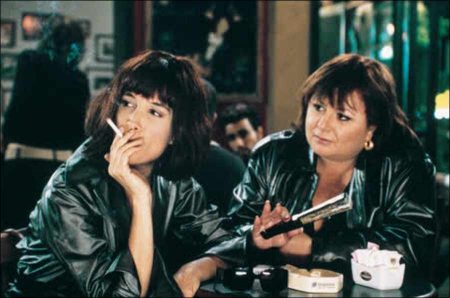Alila movie storyline. In Tel Aviv, gloomy Ezra hires foreign workers without permits to build an addition to a homely block of flats where his ex-wife Mali lives with her current lover Ilan. Ezra and Mali’s young son Eyal hates the army and is AWOL, living among prostitutes and drug dealers.
Gabi, a beautiful young friend of Mali’s, is carrying on an affair with Hezi, an older man who insists on secrecy and rents an apartment in the building for their trysts. Neighbors complain about the noise of their lovemaking and of the construction. Lives revolve slowly around one another. “Everyone’s out for himself,” says Ezra of Israeli society. Suicide bombings and elections provide a backdrop.
Amos Gitai chooses a turbulent time in his country’s history to make a sociological, less overtly political film. An ensemble drama laced with lighter moments that depicts the vitality, resilience and moral dilemmas of the people of Tel Aviv. Much of the deeper significance will be lost on audiences beyond national borders, making this less likely to travel.
Alila is an Israeli – French comedy drama film directed by Amos Gitai and starring Yaël Abecassis, Hana Laszlo, Uri Klauzner, Ronit Elkabetz, Amos Lavi, Lupo Berkowitch, Liron Levo, Yosef Carmon, Amit Mestechkin, Lyn Hsiao Zamir, Tomer Russo and Dalit Kahan.
Screenplay by: Amos Gitai, Yehoshua KenazMarie, Jose Sanselme. The screenplay was written by Amos Gitai, Yehoshua KenazMarie and Jose Sanselme.

Film Review for Alila
After three features that reflected on the historical roots of Israeli conflict, Amos Gitai chooses an especially turbulent time in his country’s history to make one of his more sociological, less overtly political films in “Alila.” An ensemble drama laced with lighter moments that depicts the vitality, resilience and moral dilemmas of the people of Tel Aviv, the film is absorbing and at times moving. But there’s a distinct feeling that much of the deeper significance will be lost on audiences beyond national borders, making this less likely to travel than some of Gitai’s recent work.
Elon Musk Reacts to Dana Carvey’s ‘SNL’ Impression, Says Show Has ‘Been Dying Slowly for Years’: ‘They Are So Mad’ Trump Won
Action revolves around an apartment block on the working-class outskirts of Tel Aviv, where Hezi (Amos Lavie) rents a room for his mistress Gabi (Yael Abecassis), whose bedroom vocals call attention to their trysts. Screaming neighbors and the din of construction work further destroy any semblance of peace and quiet as one of the residents builds an unauthorized extension into the courtyard.

Interwoven with the story of Gabi’s growing dissatisfaction with the terms of the relationship, Gitai recounts the problems plaguing a neighboring family. Ezra (Uri Klauzner) has been pushed aside by wife Mali (Hanna Laslo), now romantically involved with a younger man (Liron Levo). Ezra also gets into trouble with cops for hiring illegal Chinese construction workers, while his son Eyal (Amit Mestechkin) has gone AWOL instead of reporting for military service.
The mosaic of everyday life mapped out by Gitai and co-screenwriter Marie-Jose Sanselme — expanding on Yehoshua Kenaz’s novel “Returning Lost Loves” — also covers a Holocaust survivor (Yosef Carmon) and his Filipina housekeeper (Lyn Shiao Zamir), a solitary neighbor living alone with his dog (Lupo Berkowitch) and a ranting policewoman (Ronit Elkabetz). The film touches on animosity in the city not only between Jews and Arabs but also between Jews of different extraction.
A profound mistrust of authority emerges through the scathingly funny observation of the cop — a kind of half-crazed witch — and of the Army through the conflict between Ezra and his son over Eyal’s desertion. But it’s the unconventional relationships more than the political context that keep the film interesting, painting a picture of a chaotic, corrupt, incestuous society where courage and human contact endure against crushing odds.
Capturing the action in long static takes or with only minimal camera movement, Gitai draws strong performances from his cast and some powerfully felt moments. Standouts arguably are the scenes between Mali and Ezra, with Laslo and Klauzner communicating achingly the sadness of bonds that survive long after the end of marriage.
Alila (2003)u/h4>
Directed by: Amos Gitaï
Starring: Yaël Abecassis, Hana Laszlo, Uri Klauzner, Ronit Elkabetz, Amos Lavi, Lupo Berkowitch, Liron Levo, Yosef Carmon, Amit Mestechkin, Lyn Hsiao Zamir, Tomer Russo, Dalit Kahan
Screenplay by: Amos Gitai, Yehoshua KenazMarie, Jose Sanselme
Production Design by: Miguel Markin
Cinematography by: Renato Berta
Film Editing by: Monica Coleman et Kobi Netanel
Costume Design by: Laura Dinolesko
Set Decoration by: Miguel Markin
Art Direction by: Miguel Markin
MPAA Rating: None.
Distributed by: Kino International, (United States)
Release Date: October 30, 2003 (Israel), June 11, 2004 (United States)
Views: 100




